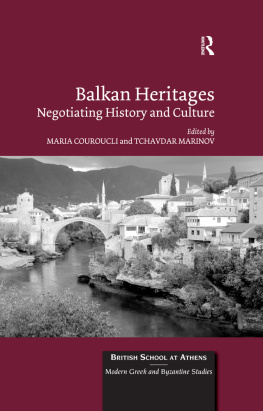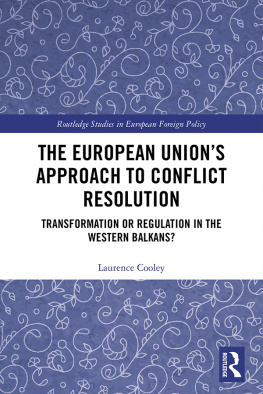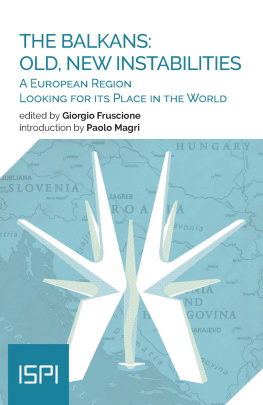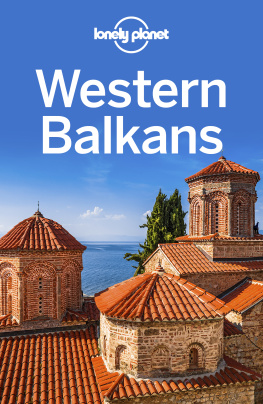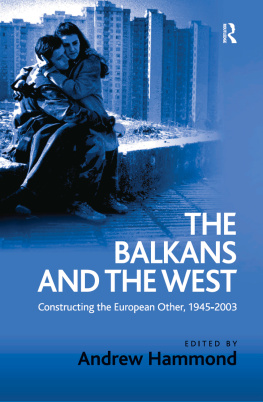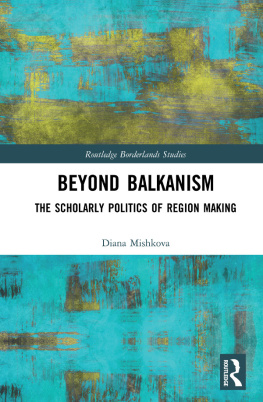Modern Banking in the Balkans and West-European Capital in the Nineteenth and Twentieth Centuries
Modern Banking in the Balkans and West-European Capital in the Nineteenth and Twentieth Centuries
Edited by
Kostas P. Kostis
First published 1999 by Ashgate Publishing
Reissued 2018 by Routledge
2 Park Square, Milton Park, Abingdon, Oxon OX14 4RN
711 Third Avenue, New York, NY 10017, USA
Routledge is an imprint of the Taylor & Francis Group, an informa business
Copyright Kostas P. Kostis and the contributors, 1999
The authors have asserted their moral right under the Copyright, Designs and Patents Act, 1988, to be identified as the authors of this work.
All rights reserved. No part of this book may be reprinted or reproduced or utilised in any form or by any electronic, mechanical, or other means, now known or hereafter invented, including photocopying and recording, or in any information storage or retrieval system, without permission in writing from the publishers.
Notice:
Product or corporate names may be trademarks or registered trademarks, and are used only for identification and explanation without intent to infringe.
Publisher's Note
The publisher has gone to great lengths to ensure the quality of this reprint but points out that some imperfections in the original copies may be apparent.
Disclaimer
The publisher has made every effort to trace copyright holders and welcomes correspondence from those they have been unable to contact.
Typeset in Sabon by Manton Typesetters, 5-7 Eastfield Road, Louth, Lincolnshire, LN11 7AJ.
A Library of Congress record exists under LC control number: 98029823
ISBN 13: 978-1-138-32370-4 (hbk)
ISBN 13: 978-0-429-45125-6 (ebk)
Contents
Kostas P. Kostis (University of Athens)
Ljuben Berov (University of Sofia)
Cristian Bichi (National Bank of Romania)
Edhem Eldem (Boazii University)
Alexandre Rostov (Institute of Balkan Studies, Bulgarian Academy of Sciences)
Andrej Mitrovi (University of Belgrade)
George Pagoulatos (University of Athens)
Franjo tiblar (University of Ljubljana and Nova Ljubljanska Banka)
Tassos Giannitsis (University of Athens)
Christos Hadziiossif (University of Crete)
Gnther Kronenbitter (University of Augsburg)
John R. Lampe (Woodrow Wilson International Center for Scholars and the University of Maryland)
Danica Mili (Historical Institute SANU, Belgrade)
Alain Plessis and Olivier Feiertag (University of Paris X, Nanterre)
Guide
This volume originated in the Athens conference on Modern Banking in the Balkans and West-European Capital, organized in January 1997 by the Hellenic Bank Association and the European Association for Banking History on the occasion of the 70th anniversary of the Hellenic Bank Association.
Some of the papers published here were presented at the conference, while others were written especially for this publication. I owe an important debt to all the volume's contributors, as well as to G. Alogoskoufis, Philip Cottrell, G. Dertilis, C. Holtfrerich, and Alice Teichova who, as commentators during the conference, greatly enriched its proceedings and results.
I would like also to thank Prof. Dr Manfred Pohl, Executive Member and Deputy Chairman of the European Association for Banking History, for his invaluable support in organizing the conference and the publishing of this volume, and Ms Emma Johnston for her assistance in coping with many practical problems. Many thanks are also due to Caroline Cornish for her help with the editing of this volume.
To John Manos, General Secretary of the Hellenic Bank Association, we owe the initial idea of the Athens conference; he supported the venture by all means at his disposal and, most especially, by his deep conviction that the history of banking is an integral part of banks' activities.
Finally, I would like to thank the Hellenic Bank Association and its President Th. Karatzas, Governor of the National Bank of Greece, for sponsoring the conference.
Kostas P. Kostis
Kostas P. Kostis
A specter is haunting Western culture the specter of Balkans. All the powers have entered into a holy alliance to exorcise this specter: politicians and journalists, conservative academics and radical intellectuals, moralists of all kinds, gender, and fashion. Where is the adversarial group that has not been decried as 'Balkan' and 'balkanizing' by its opponents? Where the accused have not hurled back the branding reproach of 'balkanism'? (M. Todorova)
In search of foes, as well as of fields in which to develop its crusading spirit, following the role it considers its own on the stage of international politics, the West was to discover, after the collapse of the so-called socialist regimes, with mixed feelings of fear, surprise and contempt, that the Balkans were still in place.
The 50 years that have elapsed since the Peninsula last appeared in the European scene as the 'Balkans' have been no more than an interlude in a long-term attempt to describe and understand this corner of Europe, which somehow failed to meet any of the stereotypes descriptive of 'the European'. The politically correct attempts to rename this world South-east Europe instead of the Balkans, in the hope that a change of name would bring about a change of reality, failed; the governments of the countries in this area continue to hold 'Inter-Balkan' conferences and its academic community still publishes 'Balkan studies', without shame.
Meanwhile, and following 1989, the West was to realize that the Balkans constituted yet another potential field of glory, since the newly formed states were in need of financial assistance in order to survive and of political counselling if they were, in turn, to benefit from the 'end of history'. An 'end of history', however, that was to prove closer to an apocalypse, as Bosnia and Albania demonstrate, than to the paradise promised by the advocates of neo-liberalism.
Nevertheless, there have been many attempts to find ways out of this predicament: international meetings have succeeded one another and many European and American projects have been suggested to help solve the political and financial problems of the area and to support the best ways to achieve Europeanization. In good faith, notwithstanding the political returns and economic benefits, the West, with its protean presence, has left no stone unturned in striving to banish from its borders a problem that irritates by its very refusal to be contained by its locale of birth.
In strategies for the economic recovery of the Balkan states, the banking factor is seen as, and undoubtedly is, fundamental. Most Balkan countries' economies are disorganized and the living standards are extremely low. Hopes of improvement are based on an influx of western capital and on a banking financing of the economy that will allow these countries' integration in the international labour division, benefiting from their comparative advantages, whatever these may be. Even in the case of the most developed of the Balkan countries, Greece, the problem remains the same: to meet the requirements for its participation in the European Economic and Monetary Union, the country needs foreign capital and the increasing number of West-European banks working in Greece shows that the interest in such ventures is mutual.



